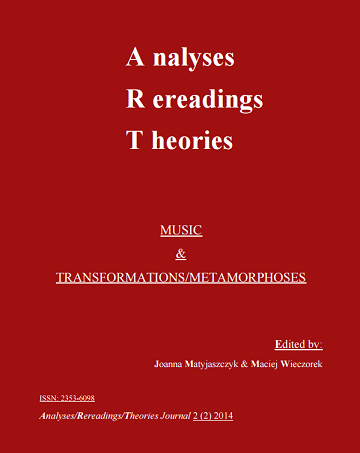The Transformation of the Mother-Daughter Relationship in Amy Tan’s The Joy Luck Club and The Bonesetter’s Daughter
DOI:
https://doi.org/10.18778/2353-6098.2.10Keywords:
Chinese American, Tan, mother, daughterAbstract
The mother/daughter bond is the central subject of Amy Tan’s two powerful books, The Joy Luck Club and The Bonesetter’s Daughter. Tensions that arise in the novels between a Chinese mother and her Chinese-American daughter are often described by the critics as being the result of two important factors. One is based on the misunderstandings caused by the generational gap, while the other comes from the cultural gap. For a Chinese-born mother the American reality instigates various confusions, as she still views her life with the eyes of her traditional Chinese upbringing. On the other hand, her daughter lacks any profound knowledge about her Chinese ethnicity, which makes her unable to recognize the influences of her mother’s Chinese past over their relationship. But in her novels Tan portrays also the relationship between the Chinese immigrant mother and her mother in China. Their relationship, which grew up exclusively on the grounds of the Chinese culture, is characterized by empathy and appreciation. In this paper I am going to discuss the change that occurred to the mother-daughter relationship after it has been replanted into a different cultural context. The line of argument will reveal in what ways the mother-daughter relationship underwent a significant transformation.
References
Adams, Bella. “Identity-In-Difference: Re-Generating Debate about Intergenerational Relationships in Amy Tan’s The Joy Luck Club.” Studies in The Literary Imagination 39.2 (2006): 79-94. Literary Reference Center Plus. Web. 23 Mar. 2013.
Google Scholar
Chen, Xiaomei. “Mother’s Tale: Reconstructing Women’s Space in Amy Tan and Zhang Jie.” Chinese Literature: Essays, Articles, Reviews (CLEAR) 16 (1994): 111-32. JSTOR. Web. 24 Apr. 2012.
Google Scholar
DOI: https://doi.org/10.2307/495309
Dunick, Lisa M. S. “The Silencing Effect of Canonicity: Authorship and the Written Word in Amy Tan’s Novels.” MELUS 31.2 (2006): 3-20. JSTOR. Web. 30 Dec. 2011.
Google Scholar
DOI: https://doi.org/10.1093/melus/31.2.3
Li, Zeng. “Diasporic Self, Cultural Other: Negotiating Ethnicity Through Transformation in the Fiction of Tan and Kingston.” Language & Literature 28 (2003): 1-15. Literary Reference Center Plus. Web. 24 Mar. 2013.
Google Scholar
Loos, Pamela. A Reader’s Guide To Amy Tan’s the Joy Luck Club. [Berkley Heights]: Enslow Publishers, Inc., 2008. Google Books. Web. 16 May 2012.
Google Scholar
Hall, Edward T. Poza Kulturą. Warszawa: Państwowe Wydawnictwo Naukowe, 1984. Print.
Google Scholar
Heung, Marina. “Daughter-Text/Mother-Text: Matrilineage in Amy Tan’s Joy Luck Club.” Feminist Studies, 19.3 (1993): 596-616. JSTOR. Web. 30 Dec. 2011.
Google Scholar
DOI: https://doi.org/10.2307/3178102
Shear, Walter. “Generational Differences and the Diaspora in The Joy Luck Club.” Critique 34.3 (1993). Literary Reference Center Plus. Web. 24 Mar. 2013.
Google Scholar
DOI: https://doi.org/10.1080/00111619.1993.9933826
Tan, Amy. The Bonesetter’s Daughter. London: Flamingo, 2001. Print.
Google Scholar
Tan, Amy. The Joy Luck Club. London: Vintage, 1998. Print.
Google Scholar
Tan, Amy. “Mother Tongue.” Read 56.4 (2006): 20-23. Literary Reference Center Plus. Web. 16 Apr. 2013.
Google Scholar
Wasiliew, Leonid. Kulty, religie i tradycje Chin. Warszawa: Państwowy Instytut Wydawniczy, 1974. Print.
Google Scholar
Wood, Michelle Gaffner. “Negotiating the Geography of Mother-Daughter Relationships in Amy Tan’s The Joy Luck Club.” Midwest Quarterly 54.1 (2012): 82-96. Literary Reference Center Plus. Web. 23 Mar. 2013.
Google Scholar
Xu, Ben. “Memory and the Ethnic Self: Reading Amy Tan’s The Joy Luck Club.” MELUS,19.1 (1994): 3-18. JSTOR. Web. 30 Dec. 2011.
Google Scholar
DOI: https://doi.org/10.2307/467784
Yuan, Yuan. “The Semiotics of China Narratives in the Con/texts of Kingston and Tan.” Critique 40.3 (1999): 292. Literary Reference Center Plus. Web. 24 Mar. 2013.
Google Scholar
DOI: https://doi.org/10.1080/00111619909604914
Downloads
Published
How to Cite
Issue
Section
License

This work is licensed under a Creative Commons Attribution-NonCommercial-NoDerivatives 3.0 Unported License.









